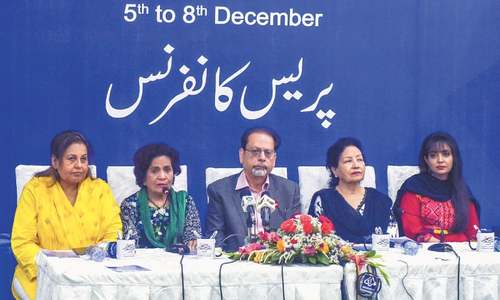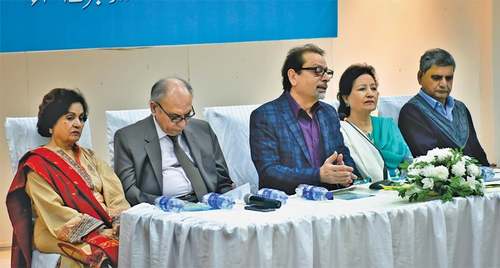
KARACHI: The 12th International Urdu Conference began at the Arts Council here on Thursday evening with two intellectually stimulating and thought-provoking keynote addresses.
Poet and secretary general of the Human Rights Commission of Pakistan Harris Khalique delivered an impassioned speech. He said the age we live in is faced with two great crises: one relates to nature and the other to society. The former is to do with climate change and the latter with [a new shape of] human society which has emerged in the form of human rights violations, suppression of democratic values, increased extremism and intellectual dishonesty.
We can see that the state’s narrative dominates public discourse and, therefore, there are curbs on freedom of expression. The role of capitalism has augmented the people’s economic suffering. Politics in the garb of nationalism and religion has taken over. Digital surveillance by secret forces of the state has put an end to the sanctity of individuals’ private lives. This is the scenario of the world at large. And in our part of the globe, its consequences can be quite dire. Perhaps the reason is that our writers and intellectuals have not completely comprehended the gravity of the problem.
Mr Khalique said in his view there are two reasons that can be attributed to this situation: the colonial structure of the state, and intellectual inadequacy. The state’s three powerful institutions –– bureaucracy, army and judiciary –– have been inherited from British rule. Since the state considers its people as its subjects [riaya], it’s always in conflict with the institutions made by civilians. All of this has inculcated and consolidated four elements in us: prejudice, loneliness, fear and anger. In these circumstances, what we have [worth writing home about] is art and literature.
Mr Khalique raised the question whether our literature is capable of fighting these crises. His answer was in the negative. However, he highlighted that literature has the role of raising awareness, alerting us to issues. Aesthetic sense can be fostered only if resistance to political denseness can be created.
Poignant questions raised as 12th Urdu conference begins
He drew the attention of the writers and poets (his contemporaries and juniors) present in the auditorium to some queries. He asked if, in today’s Pakistan, Urdu writers write about the resistance movement in Balochistan, about Waziristan.
“Do they understand the ill behaviour towards religious minorities, Azadi march and the newfound passion in the country’s students? Do they remember the Baldia factory incident? If a newspaper column can’t be published today, then tomorrow a short story will meet the same fate. If today Adeela Suleman’s artwork can’t be displayed, then tomorrow mushairas will not take place,” he cautioned.
Indian scholar Prof Shamim Hanfi was the second speaker. He said we live in a post-truth world, a term that’s hard to fathom, and the problems that it has spawned cannot be encapsulated in a limited time.
He argued that this world will move on. However, when the global institutions that are meant to support our philosophical, cultural, economic lives are found wanting, then what can one expect of those who create art and literature? It leaves them with a kind of helplessness. It is not easy to pen your thoughts in such an environment, as it was not easy even for our greatest poet Ghalib. At this point he quoted Ghalib’s verse:
Ay nau aamuz-i-fana himmat-i-dushwar pasand Sakht mushkil hai ke yeh kaam bhi aasaan nikla
[Oh you new to the realm of destruction, you invite difficulties It has turned out to be a simple task, which is the biggest difficulty]
End of the future?
Prof Hanfi said though the issues confronted by those who lived in the 19th century weren’t less painful, the kind of intellectual and moral privation that we have today wasn’t the feature of that century. After the conjuring of phrases such as death of literature, death of history, death of imagination, now the end of the future is being announced. “What kind of progress is this that we can’t even talk about without feeling ashamed about it?” he remarked.
Prof Hanfi said today we see in front of us a world full of suspicion and insecurity and behind us is a backward land of peace. The basic issue is of the here and now. Today no one can write poetry or stories on a tranquil island. Life is moving at a fast pace. Poetry and stories cannot be penned when one is gasping for breath. Art and literature’s durable culture and experience move at a steady speed. These days we have information garbage all around us. This ungainliness is the fruit of progress which has turned our era into an age of darkness. It has made the job of writers and poets important on two counts. One is responsibility of thought and the other is that there is a need for paying attention to the morality of literature in contemporary times that should ignite new debates. We can’t move without them, he added.
Chief Minister of Sindh Syed Murad Ali Shah praised the organisers’ efforts in putting together the moot. He mentioned the inclusion of sessions on all regional languages of Pakistan pointing out that it’s pertinent because the people of Sindh have always advocated for pluralism. He also underlined the fact that Dec 5 is the birthday of poet Josh Malihabadi (the day the 12th edition of the conference was being inaugurated).
Stressing the significance of politics, he remarked if there is divisiveness in politics then it’s difficult to have cultural integrity.
Sindh Minister for Culture and Tourism Syed Sardar Shah and president of the Arts Council Ahmed Shah also spoke.
Ayoub Shaikh moderated the opening session, which was followed by a session on Ghalib’s life and work.
Published in Dawn, December 6th, 2019














































Dear visitor, the comments section is undergoing an overhaul and will return soon.